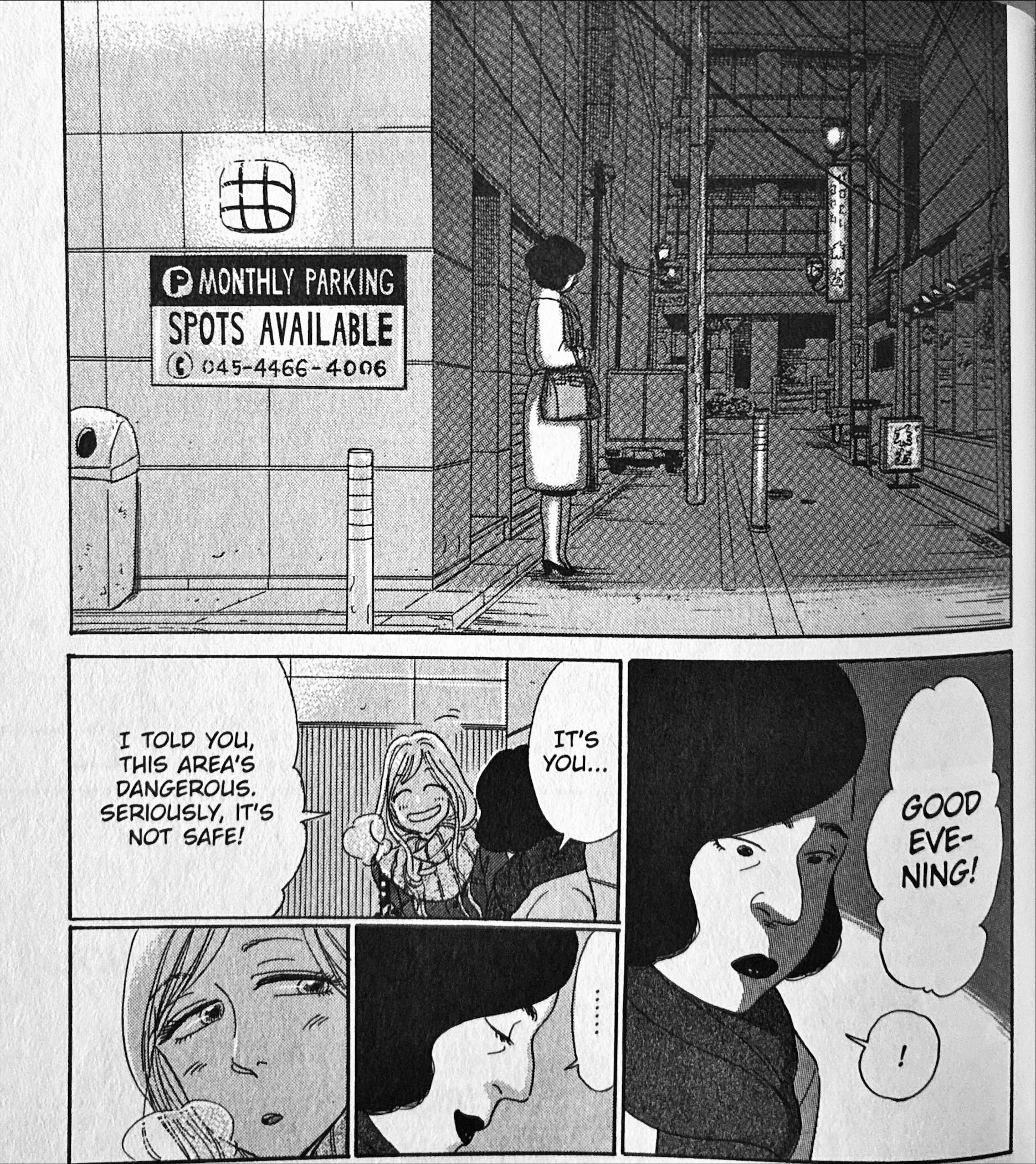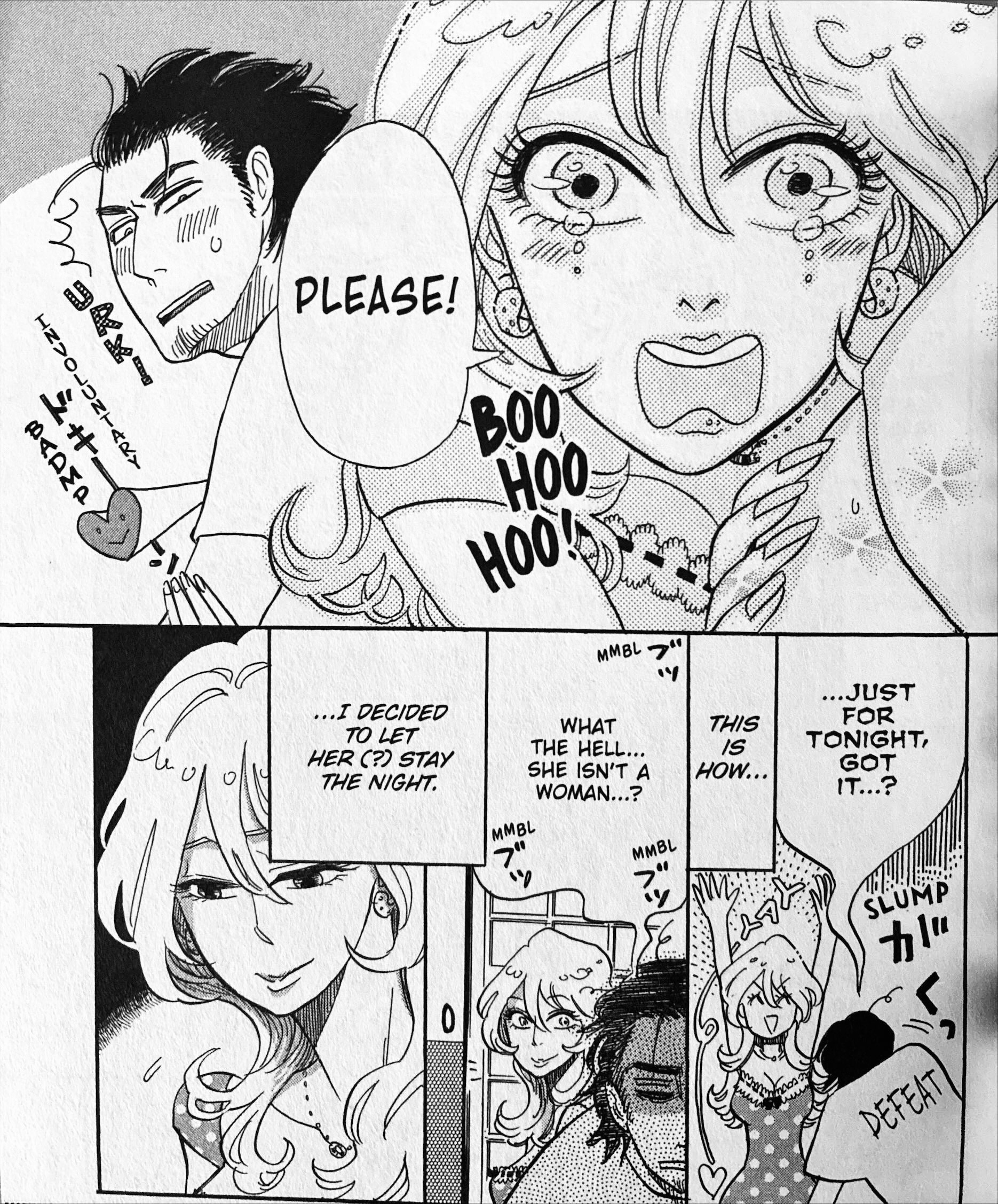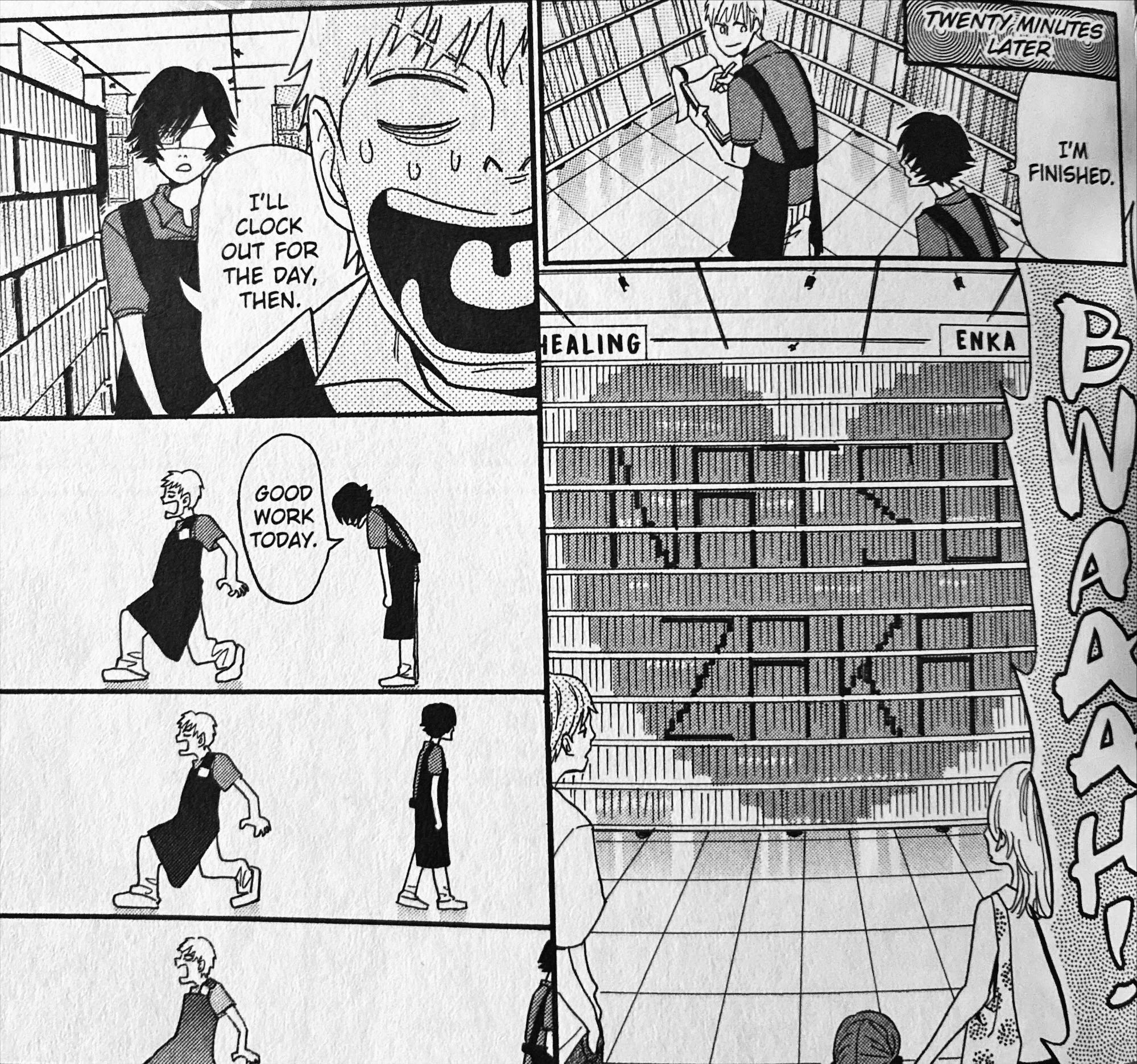 Farewell, Daisy: Jun Mayuzuki Short Story Collection
Farewell, Daisy: Jun Mayuzuki Short Story Collection
Writer and Artist: Jun Mayuzuki
Publisher: Yen Press (print & digital)
Translation: Amanda Haley
Lettering: Abigail Blackman
Publication Date: Aug 26, 2025
Rating: Mature
Genre: Manga (JPN), Comedy, Romance, Drama, LGBTQ+
Jun Mayuzuki is the creator behind acclaimed series such as After the Rain, a nuanced relationship between a high school girl and her 40-year-old boss, and Kowloon Generic Romance, a poignant dystopian sci-fi with romance woven in. Both series have garnered notable attention and were adapted into anime series. Now that Kowloon Generic Romance started the flame of interest, Yen Press is keeping it lit, and there couldn’t be a better time for introducing Farewell, Daisy, Mayuzuki’s shorter works to English-speaking fans!
 ©Yen Press, 2025
©Yen Press, 2025The stories in this collection were published over a 10-year period, between 2007 and 2017. Still, it’s interesting how tightly they are linked to each other and revolve around a singular theme despite some of them being created years apart. I won’t spoil what’s happening in the stories themselves; however, I’ll break down each story’s themes in detail.
In each story, save for the first, our main character is a cis woman from different backgrounds and ages. One is a witch who ascends to earth as a high schooler, while the others are working adults. In Everyday, the main character is a cishet man who meets a trans woman. The common thread running through these stories is the transactional side of a relationship. This transaction can be related to the act of sex, as it is in Liver and Garlic Chives, or sexual desire, as it is in Connected Night, crumbs your crush is throwing at your way to keep your obsession aflame unknowingly; Mayuzuki touches upon happiness, fulfilment, desirability, age, womanhood, and romantic love in these stories.
Thumbelina and Connected Night
Not only are the relationships with lovers seen and lived through a transactional lens, but also the relationship with the self. In Thumbelina, our unnamed protagonist is a conventionally beautiful woman who works as a salesperson and is in a relationship with a man. She also has a Twitter account where she posts photos of her cooking daily, which receives a fair amount of interaction. One day, she comes home to her boyfriend lazing around and starts dinner preparations. But the boyfriend has other plans in mind.
What follows can barely be called a sex scene; it’s a quickie that’s uncomfortable to read. He quickly enters our protagonist. The panels alternate between her face and the tandoori chicken she just put into the microwave. After he’s done “taking what he wants,” he hurriedly leaves for plans with friends. She is sitting on the floor, clearly in disbelief, while the microwave beeps in the otherwise empty kitchen, announcing that the food is done. Throughout, she speaks of consuming and being consumed, while she’s constantly paralleled with food, meat specifically.
 Thumbelina ©Yen Press, 2025
Thumbelina ©Yen Press, 2025Yuuki in Connected Night works as a server in a pachinko parlor and is in an equally stale relationship that has pretty much run its course. Yuuki turns to the world behind her flip phone’s screen: a “naughty image board” where people post suggestive photos anonymously. Yuuki is blessed with a body deemed attractive by mainstream culture, and she uses this board for “safe” attention. She isn’t interested in cheating or finding someone to connect with; she simply enjoys these strangers pouring words of validation and praise.
What sticks out like a sore thumb in her boringly mundane life, except her douchebag of a boyfriend, however, is a woman in her 40s who stands outside at the corner of the parlor where Yuuki’s working. Every night, she stands in the corner for a fixed period. One night, Yuuki sees a man cornering the woman, offering her money and being persistently unrelenting despite her refusal of the man’s advances. Yuuki intervenes as if she’s her mother and de-escalates the situation. However, she has no idea she’s in for an awakening.
 Connected Night ©Yen Press, 2025
Connected Night ©Yen Press, 2025Both Thumbelina and Connected Light focus on women who seek validation and fulfillment that they cannot get from their partners or find in their everyday lives. When genuine interaction, love or care is absent, the next best (and fastest) thing is the instant gratification social media provides.
True introspection, which may require a necessary and substantial change, is unpleasant and tough to navigate. It’s painful at times, and one needs courage to step out of one’s “comfort” zone that’s stopped being comfortable or nurturing a long time ago. I appreciated that this step towards change isn’t a result of a “personal healing journey” but instead facilitated by another person, by facing the other and themselves in return, and truly taking their perspective in.
Their search for desire and fulfillment, of course, cannot exist outside the context of the experience of womanhood in a gendered society. Wanting to be taken seriously, be seen as worthy and equally human with feelings that can get hurt, with a body with boundaries, and a mind that’s capable of thinking. Simple and factual, yet the hierarchy born out of heteronormativity, along with the metrics of “success”, “productivity”, and “efficiency” applied to interpersonal relationships, complicates it all. A romantic companionship that’s supposed to be about sharing a life turns into a trade with a scale tipped heavily on one side.
We are social beings, so of course, we will look for and engage with others to build a sense of self and social media can be considered one of the outlets that provides the safe distance needed for various reasons. On the other hand, when healthy communication and conflict are replaced with quick dopamine hits quantified in the number of likes, the virtual exchange ends up replacing one transactional relationship with another.
Liver and Garlic Chives
Another item on the transaction list is the fear of aging, of no longer being perceived as beautiful and desirable. The act of not fulfilling your desires, sexual or otherwise, is as complicated as trying to fulfill them, and there’s shame attached to the act, no matter what. In Liver and Garlic Chives, Kyouko Sakagami is a popular author who champions sexual liberation for women. Behind closed doors, however, she’s never climaxed once during sex, which is a big insecurity for her. She wants the action, but when it actually comes to it, she’s out the door faster than light.
 Liver and Garlic Chives ©Yen Press, 2025
Liver and Garlic Chives ©Yen Press, 2025To her, sex is an act of conquest. A battle to be won. Proof that she’s an independent, smart woman, and in control. She won’t settle for a broke, ugly, unsuccessful man—a lesser version of her. So she’s understandably frustrated with herself when she abruptly starts fantasizing about a dreary, depressed, shady middle-aged man living in the same apartment complex she sees one day. Why is this man “invading” her imagination when spending alone time with her vibrator? What does her desire say about her? The story explores what it means to be a woman who desires.
Everyday
The opening story of the collection, Everyday, is about Yohsuke, who’s rough around the edges. He has a strong sense of justice, a character trait that has made it impossible for him to keep a job. While venting at his friend’s bar, a drop-dead gorgeous woman named Emily approaches him. They immediately hit a love hotel, where Yohsuke discovers Emily is a trans woman. One thing leads to another, and Emily inserts herself into Yohsuke’s house and life.
Initially, this story was a bumpy ride. Despite his heart skipping a beat here and there when looking at Emily, Yohsuke deadnames and misgenders her. Meanwhile, Emily’s self-worth and happiness are tied to whether she can pass as a cis woman, and that validation can only come from a “manly” cis, heterosexual man like Yohsuke.
 Everyday ©Yen Press, 2025
Everyday ©Yen Press, 2025With the rise of the far-right, conservatism, and anti-LGBTQ+ sentiments, stepping into the collection with such a story wasn’t easy. I’m more or less familiar with the discussions around passing—how for some it’s validating and important, while for others, it’s not something they strive for. As a non-trans person, I’ll leave it at saying this story ties thematically to the rest in terms of womanhood, how heteronormativity can be restraining and damaging, but “desirable” in a certain context, how Emily positions herself as the provider in the relationship as a cishet woman traditionally would in a marriage, in return for Yohsuke’s validation.
Trans identity is an essential part of the discussion around womanhood, and despite my initial reaction to Yohsuke’s phobic language, I came to appreciate that it had a place in the bigger picture, and Everyday turned out to be a story that sparked questions and portrayed a complex and empathetic trans woman.
Refreshing Psychedelic and Farewell, Daisy
The remaining two stories, Refreshing Psychedelic and Farewell, Daisy, focus on two women so full of love to the point of blindness or obsession. Refreshing Psychedelic‘s Saiko is obsessed with her unsuspecting coworker Natsuzaka, who is helpful, kind and happily dating someone. Meanwhile, Daisy in Farewell, Daisy is a witch visiting Earth as a high school girl and instantly falls in love with her sorry excuse of a boy-slash-classmate, Kenji. He is infamous when it comes to the way he treats young women. He starts dating Daisy soon after he dumps his current girlfriend, and it’s evident in the way he treats Daisy as well.
 Farewell, Daisy ©Yen Press, 2025
Farewell, Daisy ©Yen Press, 2025There is no relationship to speak of in either of these circumstances; Natsuzaka is already dating and Kenji seems no more interested in Daisy beyond sleeping with her. What’s different in these cases than Thumbelina or Connected Night, however, Natsuzaka and Kenji seem like an outlet for Saiko and Daisy to pour their overflowing love and attention into. They are relishing the exhilaration of being in love. While that high is always accompanied by lows, such as Kenji finding someone else the second Daisy has to return to underground for a while or Saiko’s devastation upon finding out about Natsuzaka’s girlfriend, the men returning their affection ultimately feels secondary.
The transactionality in these stories is in the eyes of the third parties. Daisy’s classmates think she’s “nuts” for letting Kenji use her like that. While Saiko’s best friend enables her obsession, her “endeavor” reads as fruitless and over the top.
 Refreshing Psychedelic ©Yen Press, 2025
Refreshing Psychedelic ©Yen Press, 2025As you can see, each story here deserves its own separate dive! Mayuzuki’s short story collection Farewell, Daisy raises compelling and thought-provoking questions through stories that are fun and fascinating to read! If you are already familiar with Mayuzuki’s works, this will be a collection I’m sure you won’t miss for the world. If you’re not familiar with the artist but would be interested in reading stories that revolve around such topics, then this collection can be a great way to get a glimpse into Mayuzuki’s nuanced and emotive pen.
An early copy of Farewell, Daisy: Jun Mayuzuki Short Story Collection was provided by Yen Press in exchange for an honest review.
Farewell, Daisy: Jun Mayuzuki Short Story Collection will be available digitally and in print on Yen Press’ website and other retailers starting from August 26, 2025.

















!["Superman" (2025) Brings Heart, High Stakes, and Surprising Twists [SPOILER-FILLED REVIEW]](https://www.supermansupersite.com/Superman_2025_Retro_Poster.jpg)



 English (US) ·
English (US) ·